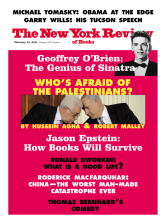In response to:
Boys Will Be Boys from the September 30, 2010 issue
To the Editors:
As a friend and reader of Edmund White since college days in Ann Arbor, I found Daniel Mendelsohn’s reading of White’s memoir, City Boy: My Life in New York During the 1960s and ’70s [NYR, September 30, 2010], and his miniaturizing assessment of White as a “gay niche writer” wrong.
City Boy revisits a time when even in lowdown Bohemian New York (where he was openly gay), legal and social repression intercepted every move in White’s psychic and social life except acts of sex and being able to write.
So irked by White’s habit of “spotlighting the moment” when he first met (or slept with) literary eminences, his “relentlessly personal perspective,” “cattiness,” “penchant for writing biographies only of other gay writers” (Rimbaud, Genet, and Proust!), and so avid to prove “what White wanted, after all, was to become part of a scene, to have a reputation, to be known as a writer” (as which writers don’t?), Mendelsohn overlooks the real Gatsbyesque aspects of City Boy—White’s initiation into the New York hippodrome of money, schooling, and class.
White was never a hick, a poseur, a frivolous or second-rate writer, even while, among the New York literati, he was an unattended one. For ten years—after publication of articles, reviews, and an “experimental” novel, Forgetting Elena (applauded by his idol Nabokov and pages of it memorized by Vera, his wife)—White rode the D train in a respectable Time magazine writer’s brown suit and tie, acting like “a man.”
The Joy of Gay Sex—which he wrote with Charles Silverstein and published in 1977—was the publication that changed his fate. The huge popularity of that book, not social climbing or ambition, gave him a bankable name. After that came States of Desire: Travels Through Gay America, another landmark of gay liberation, another political act. Not until the publication of A Boy’s Own Story was he finally free to come out as a stylist of the self.
Mendelsohn picks from City Boy a post- Stonewall confrontation White describes with critic Richard Poirier as a revelatory incident in sizing up White. Like Foucault and Susan Sontag, Poirier was one of a gay opinionate critically flogging “universalism” over the strait gate of homosexuality. All of them, on the page, chose keeping quiet about being gay.
White argues the merits of a gay literature for the newly liberated gay audience. For this transgression, Poirier (like Mendelsohn) is outraged.
No matter most writers have a persistent formative story that takes a life’s work to address. Never mind White’s storytelling prowess; his using himself as a pivotal outsider; his siren’s sentences, their outlaw daring and nerve. Forty years after Poirier, Mendelsohn again shuts the clubhouse door on White, who “aimed to fill a niche instead of a universe,” even when (the critic says) the need for that niche has passed.
Has it? Politicians and zealots stymie gay marriage. Gay bashing drives a Rutgers student to suicide. Repeal nearly stalled on “Don’t ask, don’t tell.” Police call the Bronx torture of a gay man the worst hate crime in the history of New York. What is the deal about homosexuality? Are equal rights for those who practice it a niche issue? If so, the niche should be fortified.
Janet Coleman
New York City
This Issue
February 10, 2011



